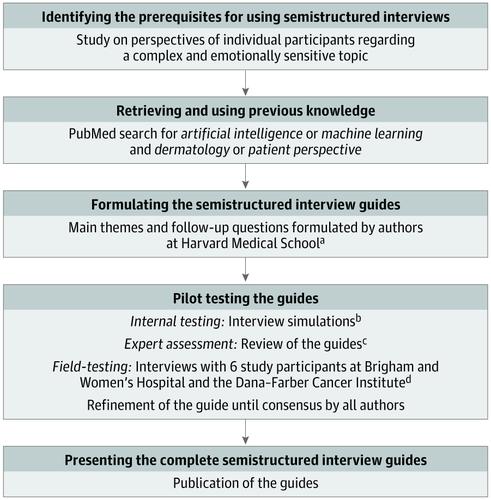JAMA Dermatology ( IF 10.9 ) Pub Date : 2020-05-01 , DOI: 10.1001/jamadermatol.2019.5014 Caroline A Nelson 1 , Lourdes Maria Pérez-Chada 2 , Andrew Creadore 2, 3 , Sara Jiayang Li 2 , Kelly Lo 2 , Priya Manjaly 2, 3 , Ashley Bahareh Pournamdari 2, 4 , Elizabeth Tkachenko 2, 5 , John S Barbieri 6 , Justin M Ko 7 , Alka V Menon 8 , Rebecca Ivy Hartman 2, 9, 10 , Arash Mostaghimi 2

|
Importance The use of artificial intelligence (AI) is expanding throughout the field of medicine. In dermatology, researchers are evaluating the potential for direct-to-patient and clinician decision-support AI tools to classify skin lesions. Although AI is poised to change how patients engage in health care, patient perspectives remain poorly understood.
Objective To explore how patients conceptualize AI and perceive the use of AI for skin cancer screening.
Design, Setting, and Participants A qualitative study using a grounded theory approach to semistructured interview analysis was conducted in general dermatology clinics at the Brigham and Women’s Hospital and melanoma clinics at the Dana-Farber Cancer Institute. Forty-eight patients were enrolled. Each interview was independently coded by 2 researchers with interrater reliability measurement; reconciled codes were used to assess code frequency. The study was conducted from May 6 to July 8, 2019.
Main Outcomes and Measures Artificial intelligence concept, perceived benefits and risks of AI, strengths and weaknesses of AI, AI implementation, response to conflict between human and AI clinical decision-making, and recommendation for or against AI.
Results Of 48 patients enrolled, 26 participants (54%) were women; mean (SD) age was 53.3 (21.7) years. Sixteen patients (33%) had a history of melanoma, 16 patients (33%) had a history of nonmelanoma skin cancer only, and 16 patients (33%) had no history of skin cancer. Twenty-four patients were interviewed about a direct-to-patient AI tool and 24 patients were interviewed about a clinician decision-support AI tool. Interrater reliability ratings for the 2 coding teams were κ = 0.94 and κ = 0.89. Patients primarily conceptualized AI in terms of cognition. Increased diagnostic speed (29 participants [60%]) and health care access (29 [60%]) were the most commonly perceived benefits of AI for skin cancer screening; increased patient anxiety was the most commonly perceived risk (19 [40%]). Patients perceived both more accurate diagnosis (33 [69%]) and less accurate diagnosis (41 [85%]) to be the greatest strength and weakness of AI, respectively. The dominant theme that emerged was the importance of symbiosis between humans and AI (45 [94%]). Seeking biopsy was the most common response to conflict between human and AI clinical decision-making (32 [67%]). Overall, 36 patients (75%) would recommend AI to family members and friends.
Conclusions and Relevance In this qualitative study, patients appeared to be receptive to the use of AI for skin cancer screening if implemented in a manner that preserves the integrity of the human physician-patient relationship.
中文翻译:

患者对使用人工智能进行皮肤癌筛查的看法:一项定性研究。
重要性 人工智能 (AI) 的使用正在扩展到整个医学领域。在皮肤病学领域,研究人员正在评估直接面向患者和临床医生决策支持人工智能工具对皮肤病变进行分类的潜力。尽管人工智能有望改变患者参与医疗保健的方式,但患者的观点仍然知之甚少。
目的 探讨患者如何看待人工智能以及如何看待人工智能在皮肤癌筛查中的应用。
设计、设置和参与者 在布莱根妇女医院的普通皮肤科诊所和丹娜法伯癌症研究所的黑色素瘤诊所进行了一项使用扎根理论方法进行半结构化访谈分析的定性研究。共有四十八名患者入组。每次访谈均由 2 名研究人员独立编码,并进行参与者间可靠性测量;协调的代码用于评估代码频率。该研究于2019年5月6日至7月8日进行。
主要成果和措施 人工智能概念、人工智能的感知收益和风险、人工智能的优势和劣势、人工智能的实施、对人类与人工智能临床决策之间冲突的反应以及支持或反对人工智能的建议。
结果 入组的 48 名患者中,26 名参与者(54%)为女性;平均 (SD) 年龄为 53.3 (21.7) 岁。16 名患者(33%)有黑色素瘤病史,16 名患者(33%)仅有非黑色素瘤皮肤癌病史,16 名患者(33%)没有皮肤癌病史。24 名患者接受了有关直接面向患者的 AI 工具的采访,24 名患者接受了有关临床医生决策支持 AI 工具的采访。2 个编码团队的评估者间可靠性评级为 κ = 0.94 和 κ = 0.89。患者主要从认知角度来概念化人工智能。提高诊断速度(29 名参与者 [60%])和获得医疗保健服务(29 名参与者 [60%])是人工智能对皮肤癌筛查最常见的好处;患者焦虑增加是最常见的风险 (19 [40%])。患者认为更准确的诊断 (33 [69%]) 和不太准确的诊断 (41 [85%]) 分别是人工智能的最大优点和缺点。出现的主题是人类与人工智能之间共生的重要性(45 [94%])。寻求活检是人类和人工智能临床决策之间冲突的最常见反应(32 [67%])。总体而言,36 名患者 (75%) 会向家人和朋友推荐 AI。
结论和相关性 在这项定性研究中,如果以保持人类医患关系完整性的方式实施人工智能,患者似乎会接受使用人工智能进行皮肤癌筛查。



























 京公网安备 11010802027423号
京公网安备 11010802027423号